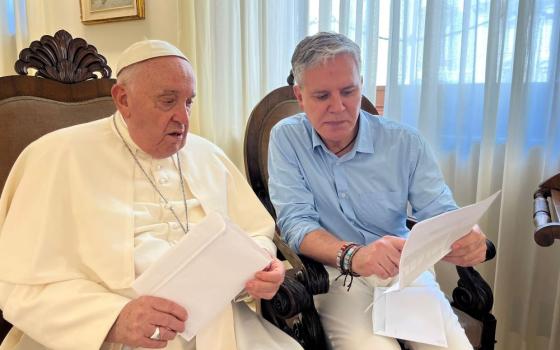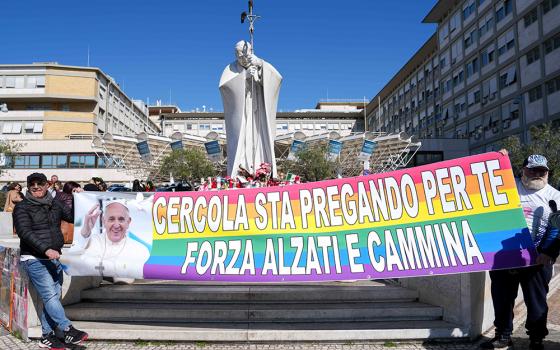
Pope Francis prays after walking through the Holy Door to inaugurate the Jubilee Year of Mercy in St. Peter's Basilica at the Vatican in this Dec. 8, 2015, file photo. In the background at left is retired Pope Benedict XVI. The pope has approved the theme, "Pilgrims of Hope," to be the motto for the Holy Year 2025. (CNS/Vatican Media)
Time, what is it?
What time is it now?
Do you have time for …?
My mom used to say, "Time comes, baby comes." The number of weeks or months counted before greeting a baby was far from exact. By the clock, time can be very precise — and that matters for a lot of mechanical or human things. But time itself passes, and it has nothing to do with the clock.
We are living in the beginning moments of a new era, the roots of which go far back. In fact, I would suggest that we haven't seen a time like this for five or six hundred years. Back around the mid-1400s, Johannes Gutenberg invented a machine called the "movable-type printing press" that revolutionized — and began to democratize — reading. The press made possible the Protestant Reformation, putting the Bible into the hands of laypeople as never before. Meanwhile, Christopher Columbus failed at finding the sea route he wanted and instead found out that the world was not at all like he and his European friends had thought.
Two hemispheres were changed unimaginably as Europe confronted America, but those novelties had a more immediate effect on the upper classes and intellectuals than they did on the peasants who made up about 90% of the population. Today, it's different.
Almost everyone in the world is affected by the communications revolution that has brought the world into our living rooms, and by the fact that AI has only begun to make us reconsider what it means to be human. This has left vast numbers of people feeling off-kilter, unsure of what the future might hold but knowing that it will be unimaginably different.
Today, as we celebrate our liturgies, we listen to literature written somewhere between about 2,000 and 2,500 years ago.
As always in the Gospel of John, there are layers upon layers of meaning to be peeled in the account of the wedding at Cana: the meaning of water becoming wine, the subtle exhortation to save the best for last, the assurance that marriage is a blessing and even the confirmation that a good party is a holy experience. Not to mention the import of Mary getting Jesus to change his mind, one of only two women in the Gospels to do so. (The other was the Syrophoenician woman in Mark 7:24-30.)
In today's reading, Jesus says, "My hour [time] has not yet come." But John has already told us that something earthshaking is about to happen. For some reason, our liturgy cuts off the first part of the first verse of this reading, but careful readers will notice that John introduced the story by saying, "On the third day, there was a wedding." The "third day!" That's the day of the Lord, the day of salvation, the day Jesus predicts as the day of his vindication.
Advertisement
Jesus claimed not to have felt that his "third day" had arrived, but Mary knew how badly it was needed. The people who ran out of wine at the wedding symbolize people who have run out of hope. They had prepared for everything to be plentiful; they were beginning a new life! And then, it started to fall apart as the joy wore thin. Mary noticed and, instead of arguing with Jesus, she told the stewards to do whatever he would tell them and all would be well. Jesus responded to his mother's urging; not because he was ready, but because the need was ripe.
As a church, we have just begun the Jubilee Year of hope. Pope Francis tells us that hope is both a gift and a duty. He tells us that "hoping is waiting for something that has already been given to us: salvation in God's eternal and infinite love."
Our world seems to be running out of joy. We're afraid for the vulnerable, we're sorrowful with the victims of war, we're concerned about our country and world, and especially about our descendants in this time of unpredictable upheaval on every front.
What are we to do? Mary herself didn't know what Jesus would do, only that he could make a difference.
In this Jubilee Year, we are invited to be pilgrims of hope. Our hour has come. We have been given the gifts necessary for the moment, we only need to "do whatever he tells you." And whether we understand it or not, God will work out the rest.








